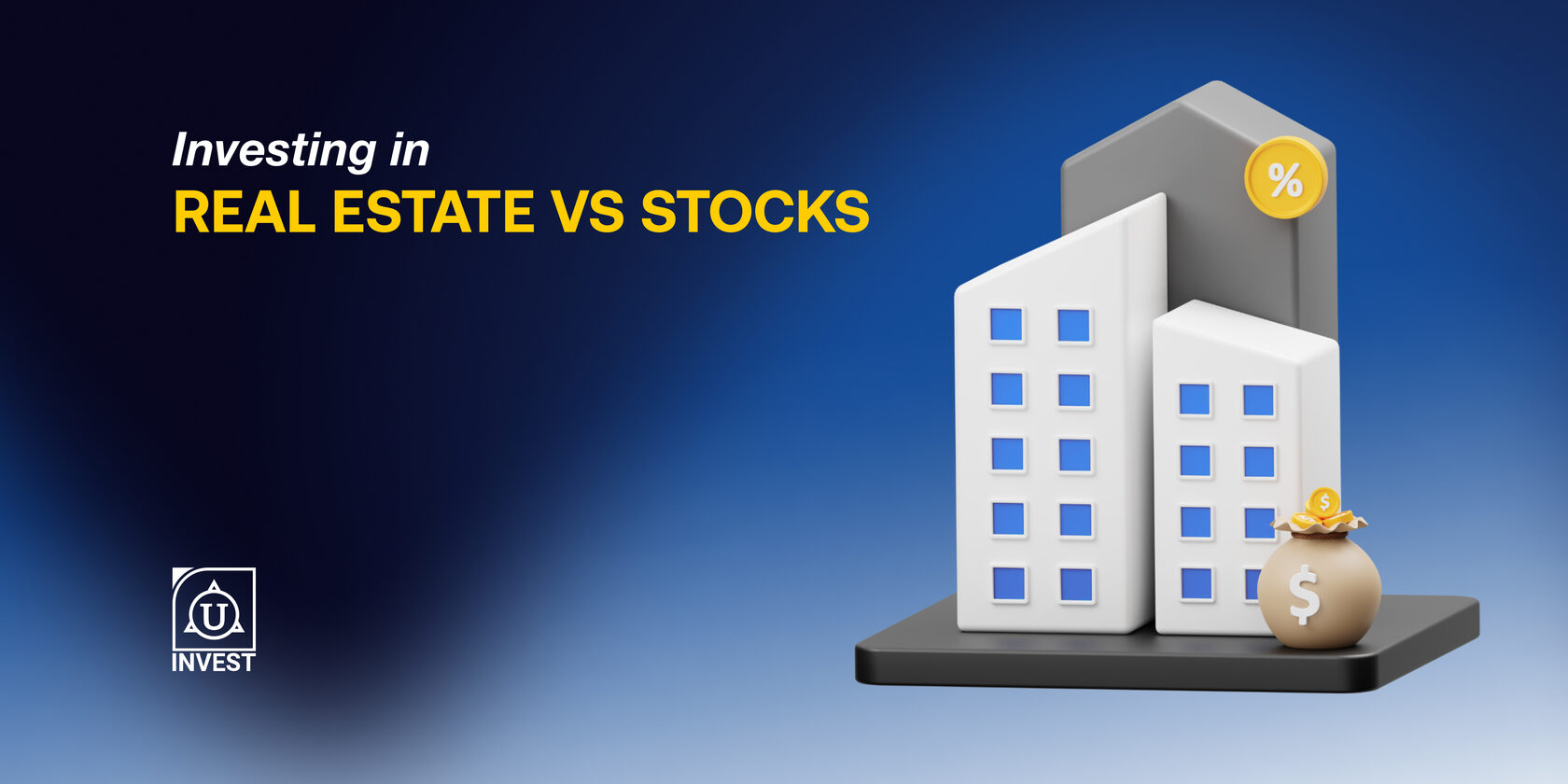The best investments tend to be in property and stocks. Both have their own unique features and advantages, but also their own specific risks. Knowing the main differences between these investment options can help you make decisions that are right for your financial goals.
In this blog, we will look at the main differences between investing in the real estate market and stocks.
In this blog, we will look at the main differences between investing in the real estate market and stocks.
1. Potential for Growth
Stocks: Stocks provide a great opportunity for growth, especially over the long term. Historically, the stock market has delivered average returns of around 7-10% annually after inflation. As companies grow and succeed, their stock prices tend to rise, which increases the value of your investment. However, the stock market can be unpredictable in the short term, with prices often swinging dramatically due to market conditions, economic changes, or company performance.
Real Estate: While real estate typically grows at a slower pace (around 3-5% per year), it can still be a solid long-term investment. Properties tend to appreciate over time, and many investors also benefit from rental income, which can provide regular cash flow. Real estate is less volatile compared to stocks, but it's important to keep in mind that local market conditions, interest rates, and demand can impact the value of your property.
Real Estate: While real estate typically grows at a slower pace (around 3-5% per year), it can still be a solid long-term investment. Properties tend to appreciate over time, and many investors also benefit from rental income, which can provide regular cash flow. Real estate is less volatile compared to stocks, but it's important to keep in mind that local market conditions, interest rates, and demand can impact the value of your property.
2. Risk and Volatility
Stocks: Stocks are generally more volatile than real estate. Their value can rise or fall quickly based on market trends, company news, or global events. The risk is higher if you invest in individual stocks, but diversifying your portfolio (buying a mix of different stocks or funds) can help spread out the risk. Even though stocks offer high potential returns, this comes with a level of uncertainty.
Real Estate: Real estate is considered less volatile, but it’s not completely risk-free. Factors like economic downturns, changes in interest rates, and local market shifts can affect property values. While real estate is more stable, it still carries risk, especially if you have to sell during a downturn.
Real Estate: Real estate is considered less volatile, but it’s not completely risk-free. Factors like economic downturns, changes in interest rates, and local market shifts can affect property values. While real estate is more stable, it still carries risk, especially if you have to sell during a downturn.

The real estate market in Armenia is relatively stable, but not without risks. Economic downturns, changes in interest rates, fluctuations in the local market, and legislative shifts can all affect the value of real estate. Armenia is a country with various risks, where even small changes in laws or the market can impact the real estate sector.
3. Liquidity
Stocks: One of the biggest advantages of stocks is their liquidity. You can buy and sell stocks quickly—often in a matter of seconds—thanks to online brokerage accounts. If you need to access cash, you can sell your stocks almost immediately. This flexibility is a key reason why many investors prefer stocks.
Real Estate: Real estate is much less liquid. If you need to sell a property, it can take weeks or even months to complete the sale, depending on the market. Plus, selling a property comes with costs like agent fees and closing expenses. If you need fast access to your money, real estate may not be the best choice.
Real Estate: Real estate is much less liquid. If you need to sell a property, it can take weeks or even months to complete the sale, depending on the market. Plus, selling a property comes with costs like agent fees and closing expenses. If you need fast access to your money, real estate may not be the best choice.
4. Diversification
Diversifying your investments is a smart strategy for reducing risk and increasing potential returns. This means spreading your money across different types of assets, such as stocks, bonds, and real estate.
Stocks and Real Estate Together: Investing in both real estate and stocks can help you build a well-rounded portfolio. Real estate investments are less correlated with stocks and bonds, meaning that they don’t tend to rise or fall at the same time as the stock market. This can help protect you from significant losses during market downturns.
For example, if the stock market is performing poorly but the real estate market is stable or growing, your portfolio could still see positive returns. Combining stocks and real estate allows you to optimize growth potential while minimizing risk. Simply investing in a few individual stocks or properties, however, can limit your growth potential and increase your exposure to market fluctuations.
Stocks and Real Estate Together: Investing in both real estate and stocks can help you build a well-rounded portfolio. Real estate investments are less correlated with stocks and bonds, meaning that they don’t tend to rise or fall at the same time as the stock market. This can help protect you from significant losses during market downturns.
For example, if the stock market is performing poorly but the real estate market is stable or growing, your portfolio could still see positive returns. Combining stocks and real estate allows you to optimize growth potential while minimizing risk. Simply investing in a few individual stocks or properties, however, can limit your growth potential and increase your exposure to market fluctuations.

5. Income Potential
Stocks: Stocks can provide income in the form of dividends, which are regular payments made by companies to shareholders. However, not all stocks pay dividends, and the dividend yield can vary depending on the company. The primary income from stocks often comes from capital gains—profits from selling a stock at a higher price than you bought it. Stocks are generally more suited for long-term growth rather than immediate income.
Real Estate: Real estate provides a more consistent income stream if you own rental properties. Rent payments can give you regular cash flow, which is particularly attractive to investors looking for income in addition to property appreciation. However, managing rental properties comes with its challenges, such as dealing with tenants, handling repairs, and ensuring the property is continuously occupied.
Real Estate: Real estate provides a more consistent income stream if you own rental properties. Rent payments can give you regular cash flow, which is particularly attractive to investors looking for income in addition to property appreciation. However, managing rental properties comes with its challenges, such as dealing with tenants, handling repairs, and ensuring the property is continuously occupied.
Which One is Right for You?
Choosing between real estate and stocks depends on your financial situation, goals, and risk tolerance. Here’s a quick summary to help you decide:
Stocks are ideal if you want high liquidity, relatively low costs, and the potential for strong long-term growth. They’re a good choice for investors looking for flexibility and a simpler, more accessible way to invest.
Real estate is a better option if you’re looking for steady income, long-term appreciation, and lower volatility. While it requires more upfront capital and ongoing management, real estate can be a stable and rewarding investment.
Many successful investors choose to combine both real estate and stocks in their portfolios.
Stocks are ideal if you want high liquidity, relatively low costs, and the potential for strong long-term growth. They’re a good choice for investors looking for flexibility and a simpler, more accessible way to invest.
Real estate is a better option if you’re looking for steady income, long-term appreciation, and lower volatility. While it requires more upfront capital and ongoing management, real estate can be a stable and rewarding investment.
Many successful investors choose to combine both real estate and stocks in their portfolios.

CONCLUSION
Both property and stocks have their own benefits, and the best choice depends on your financial goals, how much risk you can accept, and your investment strategy. Stocks can make a lot of money quickly, but you can't easily get your money back. Property is more stable and provides a regular income. By investing in both, you can create a balanced portfolio that increases your returns while reducing risk. The most important thing is to make sure your investments match your long-term goals and to talk to a financial advisor to make the best decisions for your future.
HOW TO INVEST?
Open a free brokerage account with Unibank Invest and start investing. The Unibank Invest app provides access to the world’s largest stock exchanges, enabling you to purchase international investment instruments, such as stocks, bonds, and ETFs.
To open a brokerage account, fill out the online application or call +374 43 004 382.
To open a brokerage account, fill out the online application or call +374 43 004 382.
